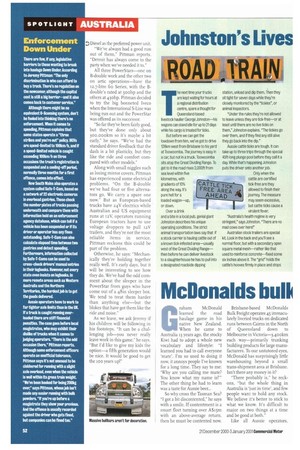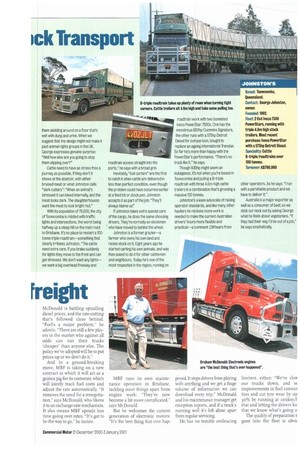Johnston's Lives pa Transport
Page 54

Page 55

If you've noticed an error in this article please click here to report it so we can fix it.
:ROAD
TRAIN_
" 51 The next time your trucks are kept waiting for hours at a regional distribution centre, spare a thought for Queensland-based
livestock haulier George Johnston—his wagons can stand idle for up to 21days while his cargo is treated for ticks.
But before we can get the
lowdown from him, we've got to drive 128km west from Brisbane to his yard at Toowoomba. The journey is easy in a car, but not in a truck. Toowoomba sits atop the Great Dividing Range. To get to it the road rises 2,000ft from sea level within five kilometres, with gradients of 10% along the way. It's pure hell fora loaded wagon—up. or down.
Over a drink and a bite in a local pub, genial giant Johnston describes his unique operating conditions. The strict animal transportation laws say that if a stock carrier is hauling cattle out of a known tick-infested area—usually west of the Great Dividing Range— then before he can deliver livestock to a slaughterhouse he has to pull into a designated roadside dipping station, unload and dip them. Then they sit tight for seven days while they're closely monitored by the "tickles", or animal inspectors.
"Under the rules they're not allowed to leave unless they are tick-free—or at least until there are no live ticks on them," Johnston explains. "The tickles go over them, and if they find any still alive they go back into the dip."
Aussie cattle ticks are tough. it can take up to three trips through the special 45ft-tong plunge pool before they call it a day. While that's happening Johnston puts the driver onto another job.
Only when the cattle are certified tick-free are they allowed to finish their journey. The measure may seem excessive, but cattle ticks cause a virulent fever.
"Australia's health regime is very stringent," says Johnston. "There are no mad cows over here" Australian stock trailers are special kit. Look in the back and you'll see a normal floor, but with a secondary open square metal mesh—rather like that used to reinforce concrete—fixed some six inches above it. The "grid" holds the cattle's hooves firmly in place and stops them skidding around on a floor that's wet with dung and urine. When we suggest that the design might not make it past animal rights groups in the UK, George expresses genuine surprise: "Well how else are you going to stop them slipping over?"
Cattle need to have as stress-free a journey as possible. If they don't it shows at the abattoir, with either bruised meat or what Johnston calls "dark cutters": "When an animal's stressed it can bleed internally, and the meat looks dark. The slaughterhouses want the meat to look bright red."
With its population of 76,000, the city of Toowoomba is riddled with traffic lights and intersections, the worst being halfway up a steep hill on the main road to Brisbane. It's no place to restart a 100tonne triple roadtrain—something that clearly irritates Johnston. "The cattle need extra care. If you brake suddenly for lights they move to the front and can get stressed. We don't want any lights— we want a big overhead freeway and
roadtrain access straight into the ports," he says with a broad grin.
nevitably, "bull carters" are the first to catch it when cattle are delivered in less than perfect condition, even though the problem could have occurred earlier at a feed lot or stock pen. Johnston accepts it as part of the job: "They'll always blame tar
If Johnston takes extra special care of the cargo, he does the same choosing drivers. They're normally ex-stockmen who have moved to behind the wheel.
Johnston is a former grazier—a farmer who owns his own land and raises stock on it. Eght years ago he started carting his own animals, and was then asked to do it for other cattlemen and neighbours. Today he's one of the most respected in the region, running on roadtrain work with two bonneted Iveco PowerStar 7500s. One has the monstrous 600hp Cummins Signature, the other runs with a 575hp Detroit Diesel for comparison, bought to replace an ageing International Transtar. So far he's more than happy with the PowerStar's performance. 'There's no truck like it," he says.
Though 600hp might seem an indulgence, it's not when you're based in Toowoomba and pulling a B-triple roadtrain with three 4.6m-high cattle trailers in a combination that's grossing a massive 120 tonnes.
Johnston's a keen advocate of raising operator standards, and like many other hauliers he reckons more works needed to make the current Australian drivers' hours more flexible and practical—a comment CMhears from other operators. As he says:1 run with a perishable product and we have to deliver it."
Australia is a major exporter as well as a consumer of beef, so we stick Our neck out by asking George what he feels about vegetarians. "If they had their way I'd be out of a job," he says emphatically.








































































































































